Understanding Hong Kong’s Mass Movement
The resolve of Hong Kong's protesters against Chinese overreach is impressive. But the American left may have misunderstood the movement.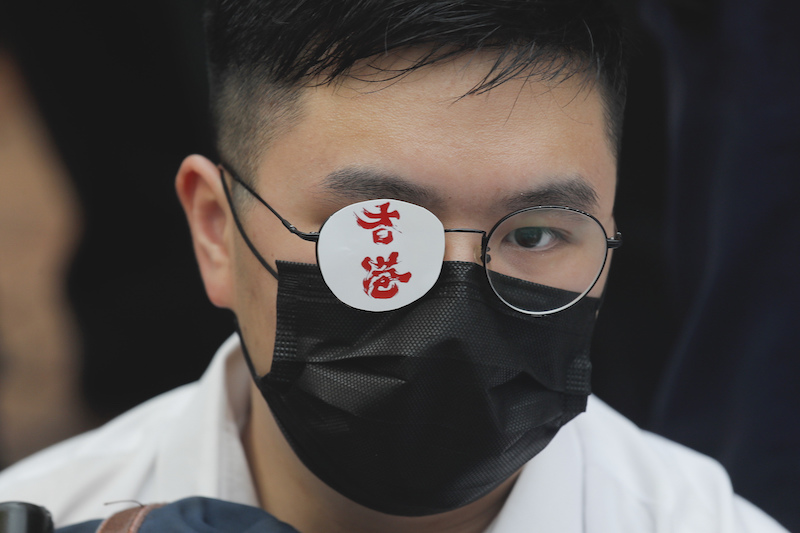 A secondary student demonstrating Monday covers one eye reading "Hong Kong" in memory of a woman injured in an earlier pro-democracy protest in Hong Kong. (Kin Cheung / AP)
A secondary student demonstrating Monday covers one eye reading "Hong Kong" in memory of a woman injured in an earlier pro-democracy protest in Hong Kong. (Kin Cheung / AP)
Update, 4:20 p.m. Monday, Sept 9: Francis Yip, an associate professor at the Chinese University of Hong Kong who has been closely following the protests, responded to reports over the weekend about Hong Kong protesters calling on President Trump to liberate them from China with the following:
There is a wide spectrum among protestors. Some have reservations about asking for any foreign intervention. Those who participated in the the march to the U.S. Consulate on Sunday do call for the Congress to pass the bipartisan Hong Kong Human Rights and Democracy Act. By upgrading pressure on China, they believe it would bring genuine democracy to Hong Kong. The signs calling on President Trump to “Liberate Hong Kong” is merely a way to catch the attention of U.S. media. Few, if any, would believe that Trump would have the power and the will to “liberate” Hong Kong.
Another point is that, while the Washington Post report mentions the “growing distrust and public animosity toward police,” it does not inform the readers that it is a result of recurrent police brutality—not just towards protestors but also towards first-aiders, journalists, and local residents. In many cases, including Sunday, it was the acts of police that provoked the seemingly violent reaction of some protestors, and such “violence” was directed toward properties (not human beings) related to the police and the MTR corporation, which is accused of collusion with the police.
For the 13th weekend in a row, protesters took to the streets of Hong Kong last weekend, marching in the rain. Some tossed Molotov cocktails at police and faced water cannons and tear gas from law enforcement authorities. Their fight against Chinese domination has continued, surpassing most expectations, and has weathered multiple storms, including the arrest Friday of several prominent activist leaders, including Joshua Wong and Agnew Chow. On Sunday, protesters tried for a second time to shut down the busy international airport of the cosmopolitan trade hub, and on Monday, thousands of students boycotted the first day of school.
At the same time the actions were unfolding, Reuters reported that Hong Kong’s Chief Executive Carrie Lam had made remarks, captured on a recording, to business leaders behind closed doors expressing deep remorse for her role in the protests. Lam said, “For a chief executive to have caused this huge havoc in Hong Kong is unforgiveable. It’s just unforgiveable.” She added, “If I have a choice, the first thing [I would do] is to quit.” Lam’s introduction of an extradition treaty with China in June, that would potentially turn over dissidents to the Chinese government, had triggered the mass activism in the first place. Three months later, Hong Kong remains crippled by relentless opposition to the bill—which Lam suspended but had until recently refused to fully withdraw. In a testament to the power of the movement’s persistence, Lam finally caved in and announced she will fully withdraw the extradition bill.
But a recent U.S.-based report on the Hong Kong protests has sowed doubt among American leftists as to the legitimacy of the Hong Kong protests. Writing in The Grayzone, Dan Cohen claims Hong Kong’s protesters are backed by the U.S. and marked by “nativism and mob violence.” Francis Yip, an associate professor of Christian theology at the Divinity School of Chung Chi College in the Chinese University of Hong Kong, has been closely following the protests. Yip told me in an interview that he was “appalled in reading this article,” which he says “has misunderstood the whole movement.” Yip contends there is a wide spectrum of political beliefs within the movement and that attempts to label it as left-wing or right-wing are futile. He maintains there is not the “kind of far-right people like the white supremacists in the United States,” to be found among Hong Kong’s activists.
Two million of Hong Kong’s seven million people have shown up to march in the streets. That’s the rough equivalent of about 93 million Americans marching on a single day in the U.S. As a comparison, if such a thing were to ever happen in this nation, it is likely that most parts of the American political spectrum would be represented among activists. Hong Kong’s mass movement may not be left-wing but neither is it right-wing, and attempts to force it to fit an American lens of “progressives versus conservatives” are shortsighted.
It is true that some prominent activists have met with American politicians in the United States. Jimmy Lai, who owns the prominent media outlet Next Digital and who is active in the movement, has met U.S. Vice President Mike Pence and Secretary of State Mike Pompeo. According to Yip, the reason is likely a simple one: Lai was interested in making the case for Hong Kong’s protesters to whomever was in power in the U.S. The Chinese response to Lai’s meetings was swift and harsh, with a foreign office spokesperson condemning both Lai and the Trump administration, saying, “These national scum and Hong Kong sinners will always be nailed to the pillar of shame in our history.”
Pro-democracy activist Joshua Wong has also met U.S. House Speaker and Democratic Party leader Nancy Pelosi, seeking international support for the movement. Democratic Rep. Jim McGovern of Massachusetts and Republican Sen. Marco Rubio of Florida have introduced a The Hong Kong Free Press says the bill seeks to “impose penalties upon Hong Kong and mainland China officials who suppress basic freedoms in Hong Kong.” Clearly there are elements in both major parties in the U.S. that are eager to undermine China’s global standing and support the Hong Kong protests to that end. But does that mean the millions of Hong Kongers who have been mobilizing for months are pawns in a nefarious U.S. plot against China? Yip is adamant that is not the case. In fact, the assertion that the U.S. is behind Hong Kong’s protests—echoed in Cohen’s article—is exactly the case China has made to try to discredit the activists.
Hong Kong’s activists have reached out to anyone who will listen for support of their movement. Wong this week traveled to Taiwan to call on its people to show their support. Indeed, this is exactly what China fears. China is worried that Hong Kong’s activism might inspire dissidents in Taiwan, or even worse, those in mainland China. In fact, there are already reports that some mainland Chinese citizens have sneaked into Hong Kong to “support a society that offers freedoms unavailable back home.”
Perhaps that is why China has gone to such great lengths to control information about the protests, especially on social media platforms. Yip says, “China has been quite active in influencing public opinion through all kinds of propaganda.” Recently Twitter discovered nearly 1,000 fake accounts that originate in China and that, the tech company said in a statement “were deliberately and specifically attempting to sow political discord in Hong Kong, including undermining the legitimacy and political positions of the protest movement on the ground.” Facebook found a smaller number of accounts it says were linked to the Chinese government focusing on the Hong Kong protests. And Google said it “disabled 210 channels on YouTube” that were behaving in “a coordinated manner while uploading videos related to the ongoing protests in Hong Kong.”
There is no mention in Cohen’s article about the many documented instances of police brutality (here, here, here and here) aimed at Hong Kong’s protesters—only of the attacks that police have faced from activists. But it is precisely the acts of violence by law enforcement authorities symbolizing the Chinese government’s overreach that Hong Kongers are resisting. Documenting the police violence would offer a counternarrative to the idea that the millions of Hong Kong protesters have no real reason to march day after day.
When I asked Yip whether the Hong Kong police answer to local authorities or the Chinese government, he answered, “This is a very good question.” He added, “The police seems to be a force that is not in complete control under the local government.” According to Yip, this may be the reason why the chief executive has so far refused to set up an independent commission to investigate police brutality for fear of discovering who is giving the police their marching orders.
Hong Kong’s relative autonomy is now under question as China reevaluates the idea of “one country, two systems.” It is precisely because Hong Kong has been a freer society compared to mainland China that these protests are taking place. And because China cannot fully control international media coverage of Hong Kong, global scrutiny has held the authoritarian government at bay. Supporters of democracy ought to be cheering the efforts of any group fighting for their civil and human rights, whether or not the U.S. government has an interest in the outcome.
Watch Kolhatkar’s interview with Yip in the video below (via Rising Up With Sonali):
Your support matters…Independent journalism is under threat and overshadowed by heavily funded mainstream media.
You can help level the playing field. Become a member.
Your tax-deductible contribution keeps us digging beneath the headlines to give you thought-provoking, investigative reporting and analysis that unearths what's really happening- without compromise.
Give today to support our courageous, independent journalists.
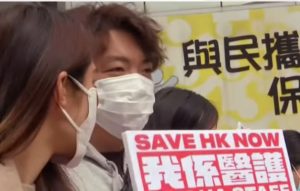

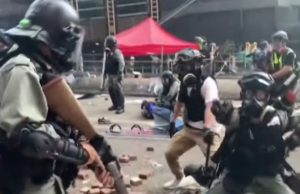
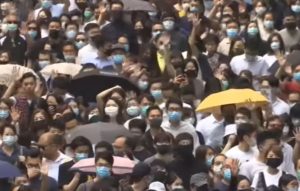
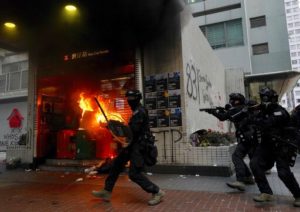
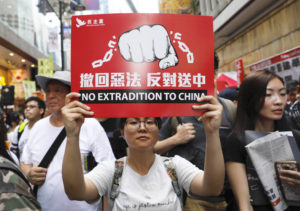
You need to be a supporter to comment.
There are currently no responses to this article.
Be the first to respond.